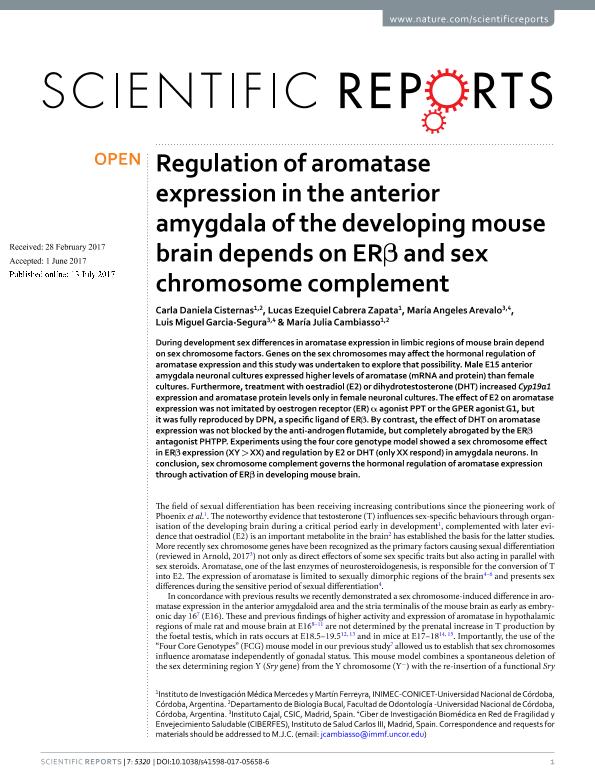Artículo
Regulation of aromatase expression in the anterior amygdala of the developing mouse brain depends on ERβ and sex chromosome complement
Cisternas, Carla Daniela ; Cabrera Zapata, Lucas Ezequiel
; Cabrera Zapata, Lucas Ezequiel ; Arevalo, María Angeles; Garcia Segura, Luis Miguel; Cambiasso, Maria Julia
; Arevalo, María Angeles; Garcia Segura, Luis Miguel; Cambiasso, Maria Julia
 ; Cabrera Zapata, Lucas Ezequiel
; Cabrera Zapata, Lucas Ezequiel ; Arevalo, María Angeles; Garcia Segura, Luis Miguel; Cambiasso, Maria Julia
; Arevalo, María Angeles; Garcia Segura, Luis Miguel; Cambiasso, Maria Julia
Fecha de publicación:
13/12/2017
Editorial:
Nature Publishing Group
Revista:
Scientific Reports
ISSN:
2045-2322
Idioma:
Inglés
Tipo de recurso:
Artículo publicado
Clasificación temática:
Resumen
During development sex differences in aromatase expression in limbic regions of mouse brain depend on sex chromosome factors. Genes on the sex chromosomes may affect the hormonal regulation of aromatase expression and this study was undertaken to explore that possibility. Male E15 anterior amygdala neuronal cultures expressed higher levels of aromatase (mRNA and protein) than female cultures. Furthermore, treatment with oestradiol (E2) or dihydrotestosterone (DHT) increased Cyp19a1 expression and aromatase protein levels only in female neuronal cultures. The effect of E2 on aromatase expression was not imitated by oestrogen receptor (ER) α agonist PPT or the GPER agonist G1, but it was fully reproduced by DPN, a specific ligand of ERβ. By contrast, the effect of DHT on aromatase expression was not blocked by the anti-androgen flutamide, but completely abrogated by the ERβ antagonist PHTPP. Experiments using the four core genotype model showed a sex chromosome effect in ERβ expression (XY > XX) and regulation by E2 or DHT (only XX respond) in amygdala neurons. In conclusion, sex chromosome complement governs the hormonal regulation of aromatase expression through activation of ERβ in developing mouse brain.
Palabras clave:
Aromatase
,
Estrogen Receptor Beta
,
Sex Chromosome Complement
,
Amygdala
Archivos asociados
Licencia
Identificadores
Colecciones
Articulos(INIMEC - CONICET)
Articulos de INSTITUTO DE INV. MEDICAS MERCEDES Y MARTIN FERREYRA
Articulos de INSTITUTO DE INV. MEDICAS MERCEDES Y MARTIN FERREYRA
Citación
Cisternas, Carla Daniela; Cabrera Zapata, Lucas Ezequiel; Arevalo, María Angeles; Garcia Segura, Luis Miguel; Cambiasso, Maria Julia; Regulation of aromatase expression in the anterior amygdala of the developing mouse brain depends on ERβ and sex chromosome complement; Nature Publishing Group; Scientific Reports; 7; 1; 13-12-2017; 5320
Compartir
Altmétricas



